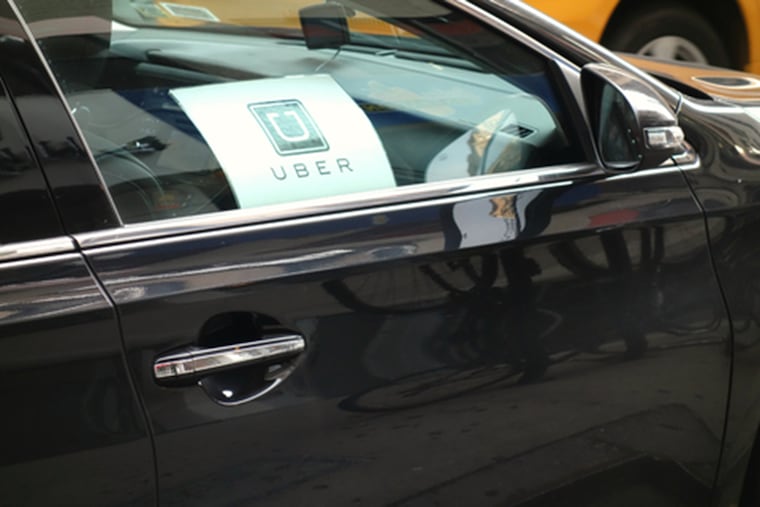Uber drivers win settlement over data breach but lose case over employee rights
A payout for Uber drivers comes a day after a loss in a California court.

Uber drivers in Pennsylvania will receive settlement money because of the company's failure to disclose a 2016 data breach, law enforcement officials announced Wednesday.
The money, $5.7 million, will be distributed among at least 13,500 drivers by the state's Attorney General's Office. The New Jersey Attorney General's Office received $3.75 million, but the 16,000 drivers there were determined to have not suffered financial harm and will not receive a payment. That money will go toward a consumer fraud account to support programs run by the Attorney General's Office.
In Pennsylvania, the affected drivers will each receive $100, with the rest of the settlement money, about $4.3 million, going toward the Attorney General's Office's public protection section.
All 50 states and the District of Columbia participated in the data breach case against Uber, and the San Francisco-based tech company reached a $148 million settlement for about 600,000 drivers affected nationwide. Up to 57 million drivers and passengers worldwide were affected, according to the Attorney General's Office of Washington state, one of the first offices to take legal action.
Uber learned that digital data stored on a third-party software platform was hacked in November 2016, according to authorities. Intruders got log-in information to an Amazon Web Services account Uber used, the New Jersey Attorney General's Office said, and through that, gained access to drivers' names and license numbers, and passenger information, including log-ins, encrypted passwords, and geolocation data.
The company paid off the hacker and received assurances that the information was deleted, authorities said, but didn't notify state officials of the breach until about a year later, which violated state laws requiring swifter notification when personal information is stolen.
Along with the financial payment, Uber agreed to make changes to its operation, including taking steps to protect user information stored on third-party platforms, creating stricter password policies for workers, creating a corporate security policy, improving protections for data, and hiring an outside consultant to regularly evaluate Uber security policies.
>>READ MORE: At Philly airport, Uber and Lyft drivers wait and wait, gambling on a big pay day
On Tuesday, another court action killed California Uber drivers' efforts to negotiate with the company as a class, rather than one-on-one, over labor issues. The five-year-old case ended with a three-judge panel deciding that an arbitration agreement that drivers there had agreed to was valid. In doing so, it eliminated the ability of drivers to pursue a class action against the company.
The decision applied to 11 groups of plaintiffs seeking reimbursement for expenses related to driving for Uber, such as vehicle maintenance and regulatory fees.
The decision has no direct bearing for Pennsylvania's Uber drivers, lawyers in the Philadelphia region said, but it does establish a pattern of courts failing to grant drivers protections as independent contractors.
Jeremy Abay, a Philadelphia lawyer representing Uber drivers, unsuccessfully sought court action in May to have Uber drivers recognized as employees, not independent contractors, over minimum wage and overtime complaints. Drivers generally are not actually seeking to become Uber employees, he said, but make arguments in favor of that conclusion to win better treatment from Uber. For example, the Uber app requires out-of-pocket expenses the company doesn't reimburse drivers for, Abay said, which was the basis for the California case.
"They were saying that Uber exerts so much control over them they were legally an employee and shouldn't be on the hook for those expenses," Abay said.
In a statement Wednesday, a spokesman for Uber said the company was pleased with the California decision. The company did not comment on the data breach settlement.
Ali Razak, the plaintiff in Abay's case and an Uber Black driver, said many drivers appreciate the freedom Uber offers them but rankle at what they see as decisions imposed on them with little regard to their circumstances. He noted that drivers can be penalized for declining requests for rides.
>>READ MORE: Should Philly limit the number of Uber and Lyft drivers?
"If you are claiming I'm independent," Razak said, "then treat me as an independent contractor."
Abay is appealing the decision in his case to the Third Circuit Court of Appeals and said the California decision would not affect that effort. It does, however, take pressure off Uber to treat drivers differently. If successful, the California case would have pushed Uber to handle complaints from drivers in that large state differently.
Meanwhile, keeping drivers locked into an arbitration system benefits the company, lawyers said. Arbitration is handled privately and can become too expensive for an individual plaintiff. In arbitration, each driver would need to hire experts and handle discovery individually, rather than spreading the costs among a group of workers.
The California case itself isn't a deal breaker, but it does continue a trend of decisions that give little solace to drivers.
"It's tough to sort of say this is some groundbreaking decision," said Casey Green, a labor lawyer with the firm Sidkoff, Pincus & Green, "but it is in the trend of decisions that have come out, which is that they're not favorable decisions."